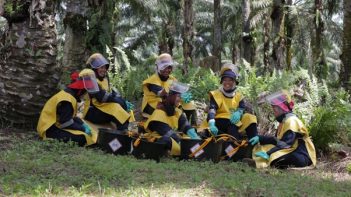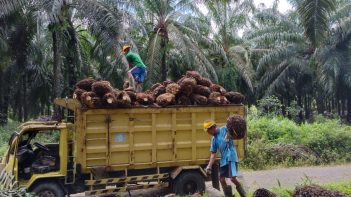| Click icon to download PDF |
The new accreditation scheme, overseen by Accreditation Services International (ASI), one of the world’s leading accreditation bodies for sustainability standards systems, is intended to bring a range of Roundtable on Sustainable Palm Oil (RSPO)- approved certification bodies into alignment with internationally-recognised standards and to advance the robustness and integrity of RSPO certification.
International testing, inspection and certification body, BM TRADA, was previously the first to be approved by governing body RSPO to offer palm oil supply chain certification, and is the current UK market leader for RSPO certification.
The pilot accreditation is said to take things to the next level by aligning BM TRADA's RSPO certification with internationally recognised standards and demonstrating that their competence, impartiality and performance capability is of the highest possible standard.
Speaking about the ASI accreditation awarded this week, Tom Johnston, Chief Operating Officer for BM TRADA Central Certification Services said: “We felt it was iimportant for the RSPO scheme to be accredited to provide credibility and align it with other international certification programmes.
“With most British firms having made a voluntary commitment to sourcing 100% certified sustainable palm oil by 2015, the new accreditation will provide an important reassurance for manufacturers, suppliers and retailers seeking a reputable organisation to oversee their own chain of custody implementation.”
“Offering accredited schemes to our clients ensures we are complying to the highest possible standards. As an approved RSPO-certification body, achieving accreditation demonstrates our full compliance with international standards – reducing risk and ensuring that consumers, suppliers and purchasers can have confidence in the services provided.”
As a global commodity used in many commercial food, personal care and biofuel products, palm oil production has increased rapidly in recent years.
However, rising demand is matched by growing concerns over the sustainability of its cultivation and the impacts on local populations and the environment in South East Asia, Central and West Africa.
In Indonesia, for example, the palm oil industry has accounted for about a quarter of the country’s forest loss — a major contributor to greenhouse gases — while the clearing of tropical forests has destroyed critical habitat for endangered species including orangutans, elephants and tigers, and led to the displacement of indigenous communities.
Against this backdrop, RSPO was established in 2004 to provide a model for responsible palm oil production and supply around the world.
In 2009 the first RSPO supply chain certification standard was launched in the UK — allowing companies to show that their supply chain is secure and traceable, and provide credible evidence of a product’s sustainability.
Last year, RSPO appointed ASI, who also work with other international initiatives including FSC (Forest Stewardship Council), MSC (Marine Stewardship Council) and ASC (Aquaculture Stewardship Council), to handle accreditation – the process of assessing an organisation that itself provides certification and inspection services.
BM TRADA has been part of the RSPO working group process since 2008 and began the accreditation process in 2012, with ASI assessing the work of their auditors and other staff responsible for overseeing a company's compliance with RSPO certification.
This included inspecting how the body handled the palm oil certification of the UK's largest food producer, Premier Foods.
To maintain accreditation, BM TRADA will be subject to an annual head office and witness audits by ASI to ensure they continue to comply with requirements.
In support of their accreditation, BM TRADA has designed an RSPO Endorsed Lead Auditor Training Course that satisfies the structured training and examination requirements to achieve RSPO Lead Auditor status for supply chain certification.
Keep reading

RSPO Releases Updated Research Agenda for Sustainable Palm Oil

Nurturing Shared Responsibility for the Future of Palm Oil

RT2025: Important Updates!

From boycotts to inclusion: Is sustainable palm oil (finally) the way forward?

REMINDER: Submission Deadline for RSPO Annual Communication of Progress (ACOP) 2024

Registrations Open for Europe SPOD 2025

RSPO: Why We've Launched a New Agile Traceability System for Palm Oil
Terms of Reference for Consultant Support of the Grower Incentives Task Force (GITF) for the Implementation of Resolution GA21-2d




